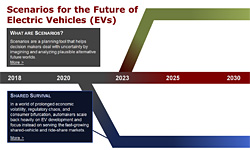Shared Survival Scenarios for the Future of Electric Vehicles September 2018
Want more free featured content?
Subscribe to Insights in Brief

Scenario Overview:
Shared Survival
Prolonged economic volatility, regulatory chaos, and extreme consumer bifurcation combine with disruptive advances in user-identification, user-rating, and blockchain technologies to create a world in which automakers scale back heavily on electric-vehicle (EV) development and focus instead on serving the fast-growing shared-vehicle and ride-share markets.
In This Scenario:
- Regulatory, trade, economic, and other factors combine to create a perfect storm to derail automakers' plans to introduce EVs by making them far more expensive and far less attractive than even the most pessimistic estimates contemplate.
- Similar factors, in combination with high-profile hacking incidents, cause automakers to scale back investment in vehicle automation.
- Widening income inequality and economic desperation help motivate many people to become interested in vehicle sharing and ride sharing.
- New technologies enable decentralized and open-source ride- and vehicle-sharing platforms that see wide engagement thanks to a strong ability to verify user trustworthiness proactively.
- Low sales growth of new vehicles and the inherent difficulty in capitalizing on sharing platforms stimulates innovation among surviving automakers.
- Vehicles with features and functions that optimize the shared-use experience see high demand. Such vehicles typically have low-cost, flexible, and robust range-extended EV powertrains.